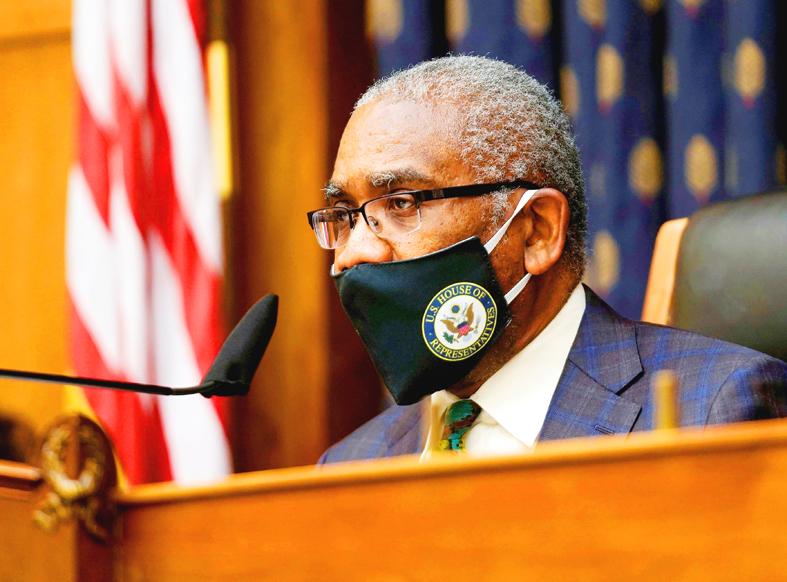A US congressional committee on Thursday passed a legislative package that includes several bills to bolster diplomatic, security and economic ties with Taiwan.
The Ensuring American Global Leadership and Engagement (EAGLE) Act was passed by the US House of Representatives Foreign Affairs Committee by a vote of 26-to-22, following four days of deliberation.
US Representative Gregory Meeks, the committee chairman, introduced the act on May 25 to “revitalize and reassert US leadership, investment and engagement in the Indo-Pacific region and globally” to counter China’s growing ambitions.

Photo: REUTERS
Several pro-Taiwan bills have been incorporated into the act, including the Taiwan diplomatic review act, Taiwan peace and stability act and the Taiwan international solidarity act.
A clause in the Taiwan international solidarity act states that the UN’s recognition of the People’s Republic of China (PRC) did not address Taiwan representation at the UN, nor take a position on the relationship between Beijing and Taipei, or Taiwan’s sovereignty.
“The United States opposes any initiative that seeks to change Taiwan’s status without the consent of the people,” the clause says.
The Taiwan diplomatic review act would direct the US secretary of state to enter negotiations with the Taiwan Council for US Affairs to rename the Taipei Economic and Cultural Representative Office in Washington the “Taiwan Representative Office.”
Other legislation in the EAGLE Act seeks to reiterate the US’ commitment to Taiwan, and recognize it as a vital part of the US’ Indo-Pacific strategy.
Meeks said the bill ensures “that America will once again lead on the world stage, strengthening our alliances, and expanding our diplomatic and economic footprint across the world to outcompete China.”
“Leadership guided by American values is central to the EAGLE Act, including the most robust provisions to date for responding to the PRC’s genocide of Uighurs, and bolstering our diplomatic, security and economic ties with Taiwan,” Meeks said.
The act also provides “temporary protected status and asylum to Hong Kongers, who have seen their autonomy destroyed by the Chinese government,” he added.
The EAGLE Act is expected to be reviewed by the full House before it would be voted on by both chambers of the US Congress and signed into law by the US president.

The Ministry of the Interior (MOI) is to tighten rules for candidates running for public office, requiring them to declare that they do not hold a Chinese household registration or passport, and that they possess no other foreign citizenship. The requirement was set out in a draft amendment to the Enforcement Rules of the Public Officials Election and Recall Act (公職人員選舉罷免法 ) released by the ministry on Thursday. Under the proposal, candidates would need to make the declaration when submitting their registration forms, which would be published in the official election bulletin. The move follows the removal of several elected officials who were

The Republic of China (ROC) is celebrating its 114th Double Ten National Day today, featuring military parades and a variety of performances and speeches in front of the Presidential Office in Taipei. The Taiwan Taiko Association opened the celebrations with a 100-drummer performance, including young percussionists. As per tradition, an air force Mirage 2000 fighter jet flew over the Presidential Office as a part of the performance. The Honor Guards of the ROC and its marching band also heralded in a military parade. Students from Taichung's Shin Min High School then followed with a colorful performance using floral imagery to represent Taiwan's alternate name

FOUR DESIGNATED AREAS: Notices were issued for live-fire exercises in waters south and northwest of Penghu, northeast of Keelung and west of Kaohsiung, they said The military is planning three major annual exercises across the army, navy and air force this month, with the navy’s “Hai Chiang” (海強, “Sea Strong”) drills running from today through Thursday, the Ministry of National Defense said yesterday. The Hai Chiang exercise, which is to take place in waters surrounding Taiwan, would feature P-3C Orion maritime patrol aircraft and S-70C anti-submarine helicopters, the ministry said, adding that the drills aim to bolster the nation’s offshore defensive capabilities. China has intensified military and psychological pressure against Taiwan, repeatedly sending warplanes and vessels into areas near the nation’s air defense identification zone and across

A Chinese takeover of Taiwan would severely threaten the national security of the US, Japan, the Philippines and other nations, while global economic losses could reach US$10 trillion, National Security Council Deputy Secretary-General Lin Fei-fan (林飛帆) wrote in an article published yesterday in Foreign Affairs. “The future of Taiwan is not merely a regional concern; it is a test of whether the international order can withstand the pressure of authoritarian expansionism,” Lin wrote in the article titled “Taiwan’s Plan for Peace Through Strength — How Investments in Resilience Can Deter Beijing.” Chinese President Xi Jinping’s (習近平) intent to take Taiwan by force